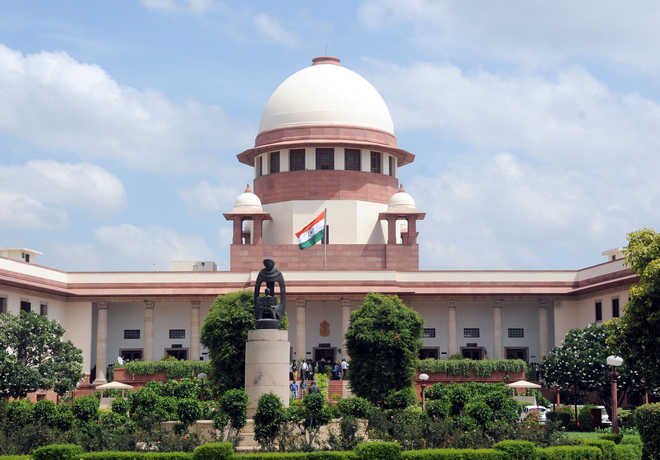Don’t decide Ayodhya dispute in any one’s favour: Plea in SC
04, Dec 2017
The Tribune
December 2, 2017
Don’t decide Ayodhya dispute in any one’s favour: Plea in SC
CJI Misra-led bench is to take up cross-appeals in Ram Janmabhoomi-Babri Masjid case on Dec 5

The bench has made it cleat that the case has to be decided in a time-bound manner.
Satya Prakash
Tribune News Service
New Delhi, December 2
Ahead of the December 5 hearing of the Ramjanmabhoomi-Babri Masjid case, 32 activists and film-makers, including Shyam Benegal, Medha Patekar and Teesta Setalvad, have moved the Supreme Court seeking a direction that “the disputed site be used for a non-religious public use, irrespective of the adjudication of the suit”.
In their intervention application, they said the dispute should not be looked at through the prism of a land dispute simpliciter and the top court should refrain from adjudicating it in favour of either of the communities in the larger public interest of safeguarding communal harmony.
Noting that it wanted a time-bound disposal of the Ramjanmabhoomi-Babri Masjid dispute, a three-judge bench headed by Justice Dipak Misra (now Chief Justice of India) had on August 11 asked the Yogi Adityanath government to get the 90,000-page oral evidence in case translated in 10 weeks and fixed December 5 to hear cross-appeals in the matter.
Almost seven years after the Allahabad High Court’s September 30, 2010, order dividing the 2.7-acre disputed land at the Ramjanmabhoomi-Babri Masjid site equally between Ram Lalla, Nirmohi Akhara and Sunni Wakf Board, the CJI-led bench is all set to take up cross-appeals filed by various parties on December 5 to fix the modalities of the hearing.
But the activists requested the top court to consider setting up a seven-judge bench to hear the case as certain Constitutional questions were bound to arise and there may be a need to reconsider its 1994 judgment that upheld acquisition of land around the disputed site by the government.
“For over three decades, this peace loving people of India, practising co-existence and negotiation between different faiths and languages, who have been held hostage to this dispute, have been, unfortunately, not heard. Their vast voice has simply not been heard.
“This small group of representatives Indians represents that vast, silent voice, that wishes above all peace, harmony and collective advancement of all Indians,” the activists submitted.
As directed by the court, translation work is said to have been completed and the CJI Misra-led bench is likely to take up the cross appeals for hearing on the eve of the 25th anniversary of the demolition of the disputed structure at Ayodhya on December 6, 1992.
The bench – which also included Justice Ashok Bhushan and Justice S Abdul Nazeer – had made it clear that the case had to be decided in a time-bound manner and no adjournment would be given in any circumstances.
On the last date, the bench had made it clear that all other petitions/interventions applications, including those by BJP leader Subramanian Swamy and Shia Central Wakf Board, Uttar Pradesh, would be kept pending as it intended to hear the main matter first.
The Shia Wakf Board has claimed the demolished mosque was a Shia Waqf as Mir Baqi who got Babri Mosque constructed was a Shia Muslim. It also supported construction of a Ram Temple at the disputed site where a makeshift temple exits at present, saying a Masjid could be built in a Muslim area.
Hindus believe that Lord Ram was born in Ayodhya thousands of years ago. During Mughal emperor Babar’s rule, a mosque was constructed at the place in 1528 after destroying the temples existing there.
The RSS, Vishwa Hindu Parishad and BJP have been running a campaign for construction of a Ram temple in Ayodhya.
On December 6, 1992, kar sevaks of right-wing Hindu organisations demolished the disputed structure. Many BJP leaders, including LK Advani and Murali Manohar Joshi, are facing a criminal case in connection with the demolition.
But the civil dispute over 2.7 acres is a separate one that has been on since 1961 when the Sunni Wakf Board took the matter to court.










